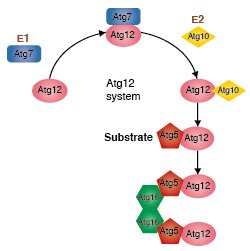Atg12 Binding Cascade
Unlike other ubiquitin-like proteins, the ubiquitin-like protein Atg12 has a C-terminal glycine, which protects it from processing. Atg12 is conjugated to the substrate Atg5 by Atg7 (an E1-like protein, and as seen in the conjugation of Atg8 to PE) and Atg10 (an E2-like protein). The Atg12-Atg5 conjugate forms a complex with Atg16. Self-oligomerization of Atg16 results in a multimer of the Atg12-Atg5-Atg16 complex. Although its functions remain unknown, this complex is shown to accumulate on the pre-autophagosomal structure (PAS) in yeast and to play an essential role in autophagosome formation.
Anti-Atg5 Antibodies: Code No. PM050 (Polyclonal) & M153-3 (Monoclonal)
Anti-Atg12 (Human) antibody: Code No. M154-3 (Monoclonal)
Anti-Atg10 (Human) antibody: Code No. M151-3 (Monoclonal)
Anti-Atg7 (Human) antibody: Code No. PM039 (Polyclonal)







